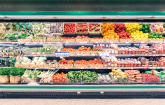ROCKVILLE, Md., Nov. 9, 2017 /PRNewswire/ -- In 2017, Amazon captured an industry-leading 18% of online food and beverage sales in the U.S. Amazon's share is double the 9% held by second place Walmart in the e-tail grocery market, reveals market research firm Packaged Facts in the new report Online Grocery Shopping in the U.S.: Food Industry Disruptor Series.
Amazon is the 800 pound online retailing gorilla for virtually every category of consumer goods one might care to mention. The company has vast experience in packing and shipping goods all over the U.S. and deep pockets for experimenting with new ways to provide those goods to its customers. So for many businesses competing in ecommerce, it seems like there's Amazon and then there's everyone else. However, in the report Packaged Facts recommends that companies "avoid trying to out-Amazon Amazon" at least when it comes to the online food and beverage segment.
For one, online grocery is a lucrative market with plenty of projected growth and a plethora of money to go around between companies competing in the space. Packaged Facts estimates that online grocery sales comprised barely 1% of the money U.S. households spent on foods and beverages in 2014. That percentage is forecast to easily balloon to a double-digit market share in coming years, and online grocery sales are projected to triple by the year 2022.
"At this stage, it is too early to determine what percentage of overall food and beverage sales will eventually be made online, but it is not unreasonable to assume a 20–30% market share by the time the market reaches equilibrium over the next decade," says David Sprinkle, research director for Packaged Facts.
Beyond the sheer projected size and growth of online grocery, Amazon's competitors can capitalize on the fact that the time-sensitive nature of perishable groceries is something new for Amazon, leaving space for many others to develop their online grocery services without having to directly compete against Amazon in terms of delivery or other areas at which Amazon already excels.
The industry has already begun to see four of Amazon's competitors capitalize on some form of this strategy:
- In some ways, the Whole Foods acquisition by Amazon has helped Instacart by creating an immediate threat to brick-and-mortar retailers that incentivizes them to develop online sales. One of Instacart's strengths is its extensive partnership portfolio with traditional grocers, both local and national. The company has partnered with over 160 different retailers across the U.S. Since the acquisition many different retailers have chosen to expand their partnership with delivery service Instacart rather than develop their own delivery infrastructure.
- To reduce online grocery delivery costs, Walmart is using its vast network of stores to offer free pickup of groceries at select Walmart locations for groceries ordered online. As of September 2017, Walmart offers online grocery pickup at 1,000 different Walmart stores around the U.S., with 400 new pickup points opened in 2017 alone. It's an effort to help consumers save both money and time.
- Using existing stores for infrastructure is also a strategy of Peapod, a wholly owned subsidiary of Ahold Delhaize. Peapod is able to make use of unused space in Ahold's Stop & Shop stores around the country as distribution centers to improve last-mile delivery efficiency. Peapod, as the only major competitor with a quarter century of online grocery experience, also relies on its extensive experience as an online grocer to efficiently deliver products to its customers. Despite this longevity, the company continues to focus on new options for its customers by working with major food producers like General Mills and Campbell Soup to produce meal-kit deals and collaborating with other outside partners to develop meal plans and offer recipes.
- FreshDirect, as one of the most successful grocery-specific online suppliers, has excelled at developing its distribution and delivery of perishable goods in the New York area, particularly for organic and locally grown foods. In fact, one could argue that the company's long-term success lies in its curation of fresh foods to the point that its customers actually trust the company to select the proper produce and meat for their orders. FreshDirect has managed to eliminate one of the main stumbling blocks of online groceries, which is the "look and feel" component many consumers still want when selecting produce and meats.
About the Report
Online Grocery Shopping in the U.S.: Food Industry Disruptor Series provides an in-depth analysis of the online sale of foods and beverages in the U.S., focusing on the key product categories and delivery styles driving the market. The report covers the online sale of groceries from traditional supermarkets and mass merchandisers now selling products online, online-only grocers and marketplaces selling perishable and non-perishable foods and beverages, and third-party pack and deliver companies.
View additional information about Online Grocery Shopping in the U.S.: Food Industry Disruptor Series, including purchase options, the abstract, table of contents, and related reports at Packaged Facts' website: https://www.packagedfacts.com/food-beverage-market-c84/.
About Packaged Facts
Packaged Facts, a division of MarketResearch.com, publishes market intelligence on a wide range of consumer market topics, including consumer demographics and shopper insights, consumer financial products and services, consumer goods and retailing, consumer packaged goods, and pet products and services. Packaged Facts also offers a full range of custom research services.
For more essential insights from Packaged Facts be sure to follow us on Twitter and Google+. For infographics, tables, charts and other visuals, follow Packaged Facts on Pinterest.
Please link any media references to our reports or data to www.packagedfacts.com.
Press Contact:
Daniel Granderson
240.747.3000
[email protected]
SOURCE Packaged Facts
WANT YOUR COMPANY'S NEWS FEATURED ON PRNEWSWIRE.COM?
Newsrooms &
Influencers
Digital Media
Outlets
Journalists
Opted In





Share this article